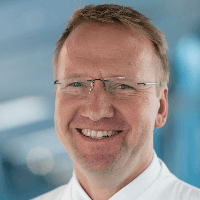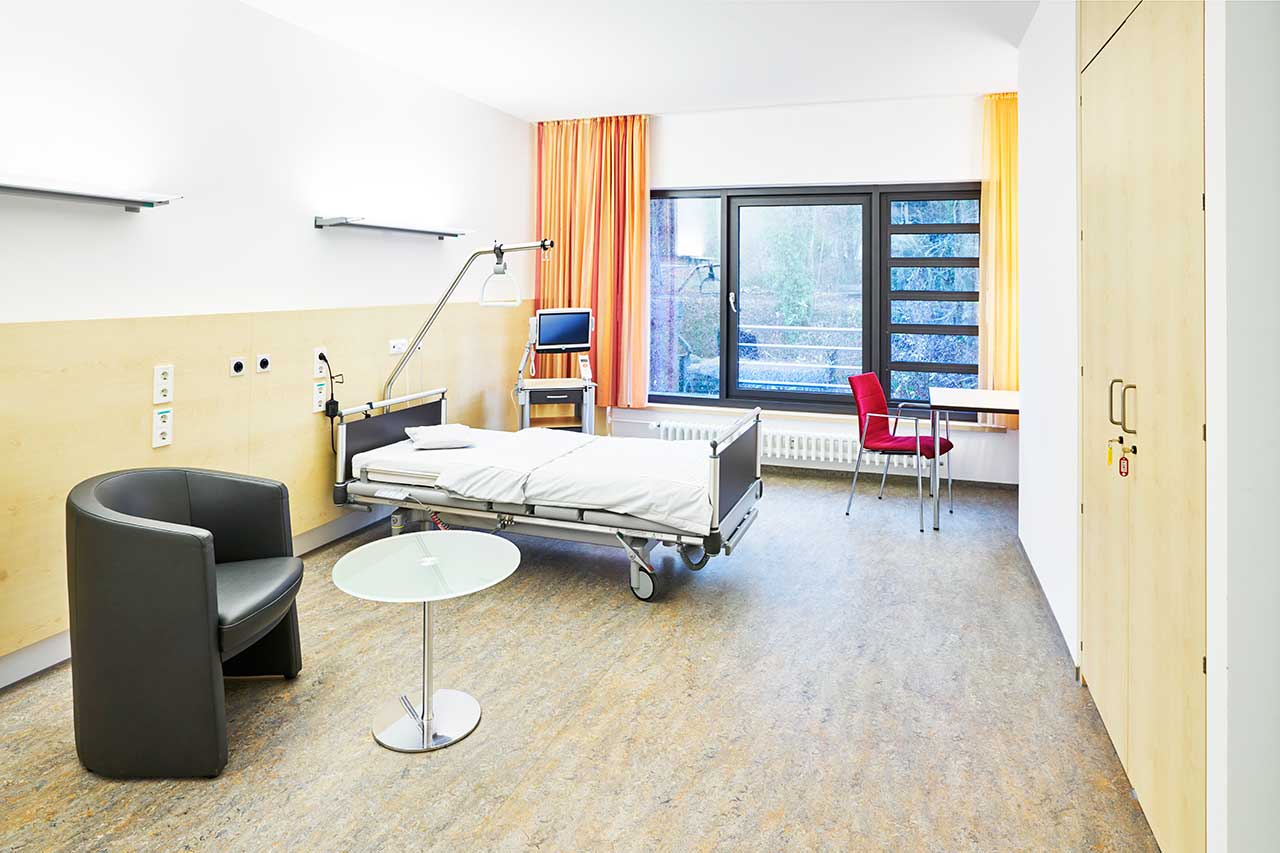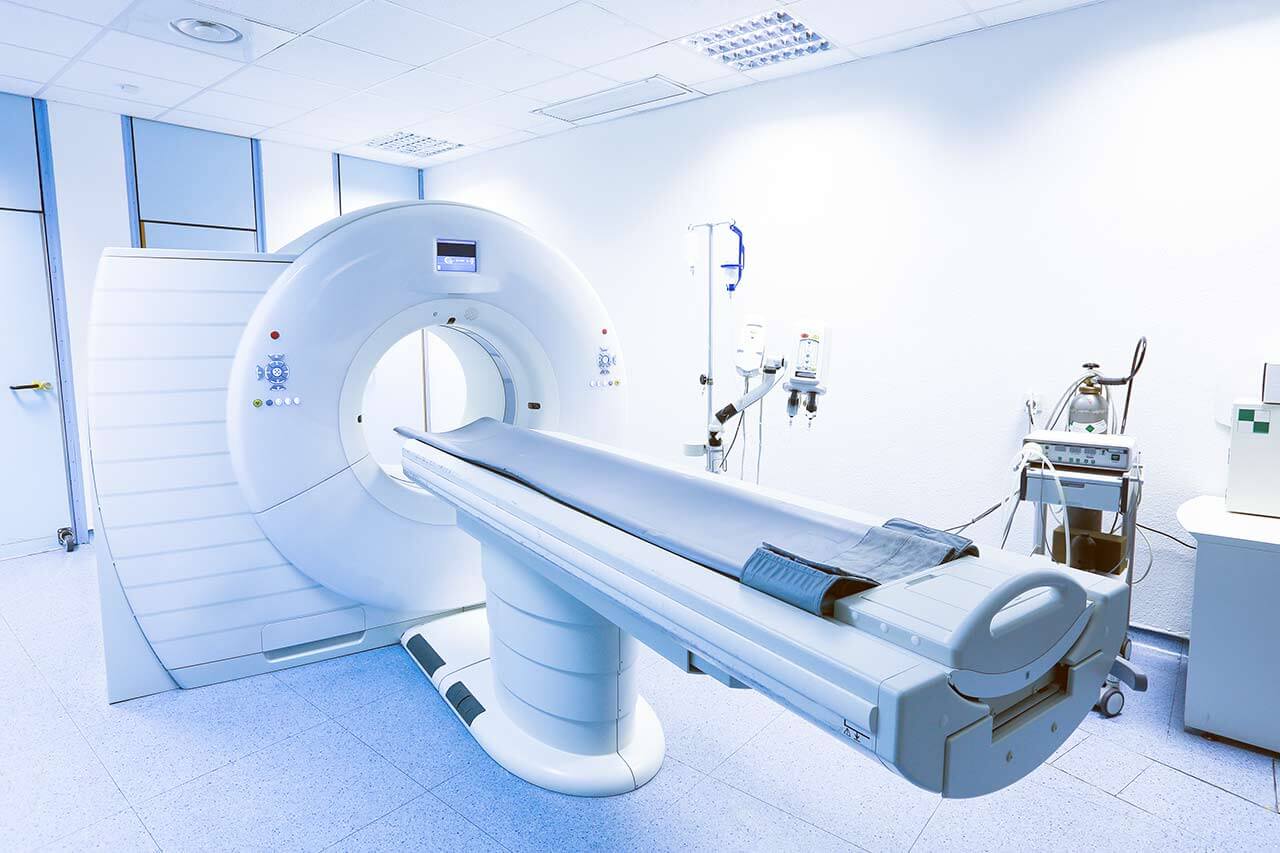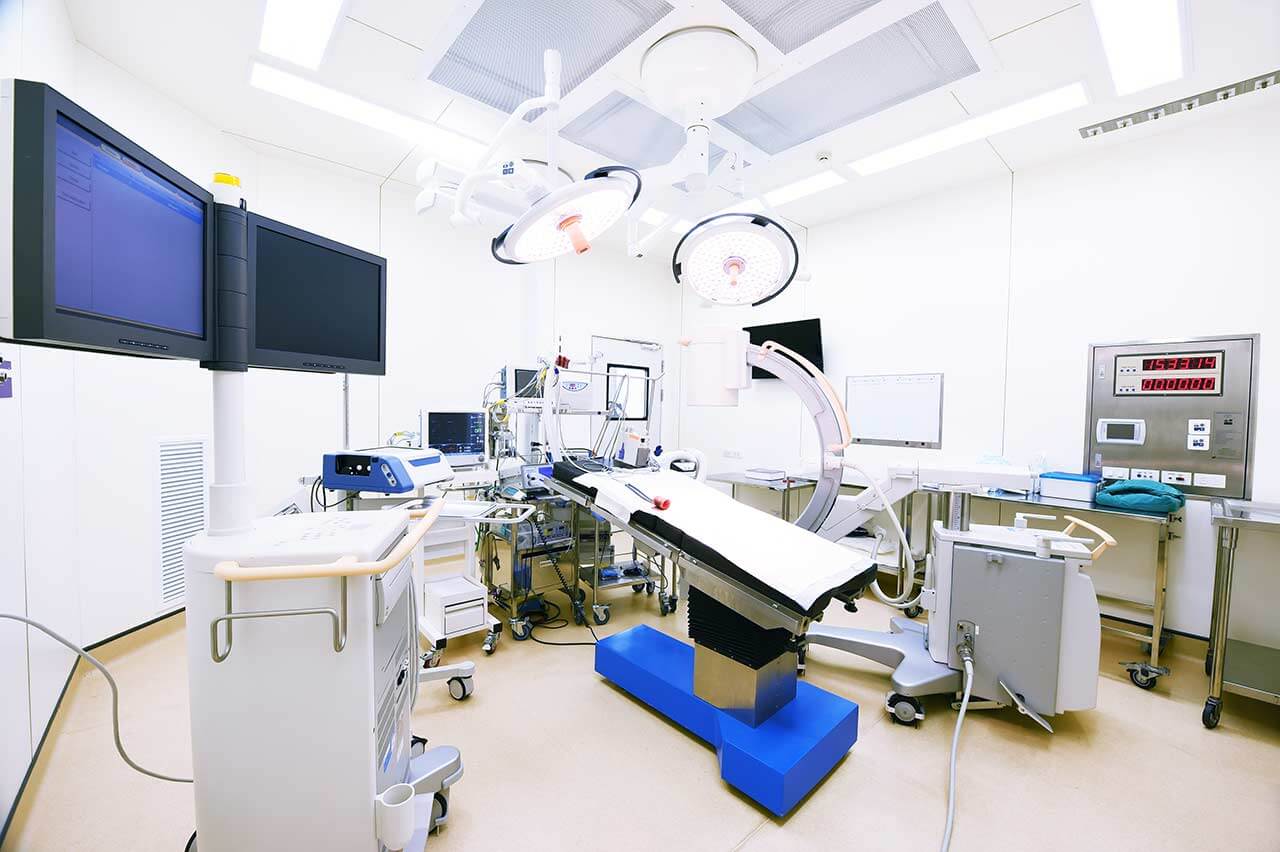
The program includes:
- Initial presentation in the clinic
- clinical history taking
- review of medical records
- physical examination
- urological examination
- laboratory tests:
- complete blood count
- general urine analysis
- α1-microglobulin in urine
- biochemical analysis of blood
- inflammation indicators (CRP, ESR)
- indicators blood coagulation
- ultrasound of the urogenital system
- renal biopsy if indicated
- histological examination
- consultation of related specialists
- symptomatic specific treatment
- the cost of essential medicines and materials
- nursing services
- control examinations
- full hospital accommodation
- developing of further guidance
Required documents
- Medical records
- Kidney US (if available)
- MRI/CT scan (if available)
Service
You may also book:
 BookingHealth Price from:
BookingHealth Price from:
About the department
According to Focus magazine, the Department of Nephrology at the University Hospital Erlangen ranks among the best specialized Nephrology Centers in Germany!
The department provides both diagnostics and treatment of all congenital and acquired kidney diseases, arterial hypertension caused by kidney lesions, as well as their complications. Particular attention is paid to kidney failure, for the treatment of which doctors use all types of renal replacement therapy up to kidney transplant (in cooperation with specialized surgeons). The department's medical team offers a unique experience in care for patients before and after kidney transplant. The preoperative phase includes a comprehensive assessment of surgical risks and expected outcomes, while therapeutic measures after the transplant surgery are aimed at preventing rejection of the transplanted kidney. The medical facility has well-equipped diagnostic and therapeutic rooms, including an advanced Renal Replacement Therapy Unit specializing in dialysis. Patients most often undergo hemodialysis and peritoneal dialysis. The department's doctors provide patients with high-quality medical services focused on meeting their individual needs and wishes. The Chief Physician of the department is Prof. Dr. med. Mario Schiffer.
The department's specialists offer optimal treatment for all congenital and acquired kidney diseases. With the help of blood tests and urinalysis, ultrasound and X-ray scans, diagnostic imaging of blood vessels and kidney biopsy, the department's doctors conduct accurate diagnostics of nephrologic disease and determine its stage. The treatment involves the use of modern medical protocols, which allow achieving complete cure or at least remission of the disease. The department can boast of its special experience in the treatment of patients with concomitant diseases, for example, vascular stenosis. In such cases, doctors from related specialties are involved in the therapeutic process.
The department has an impeccable reputation in the treatment of acute and chronic kidney failure. In addition to all types of renal replacement therapy, the department uses other extracorporeal treatment methods, for example, extracorporeal membrane oxygenation (ECMO), implantation of artificial heart ventricles (LVAD, RVAD), Prometheus® therapy, etc. Special attention is paid to transplant medicine. The responsibility of the department's nephrologists includes preparation for surgery and postoperative care after kidney transplant. Kidney transplant procedures are performed cooperatively by specialists in general surgery, urology and vascular surgery. The Transplant Center of the university hospital performs more than 70 kidney transplants every year, so all therapeutic processes are perfectly organized and patients can be sure that they will get the best result.
The department's doctors have extensive clinical experience and professional skills in the treatment of genetically determined nephrological diseases of unknown origin, genetic neoplastic diseases of the kidneys (for example, Von Hippel-Lindau syndrome, rare types of polycythemia), congenital kidney pathologies (for example, tubulointerstitial nephritis, thrombotic microangiopathy), glomerulopathies caused by lysosomal storage diseases, systemic diseases with kidney lesions, polycystic kidney disease and other pathologies. The course of treatment is usually based on the intake of modern medications for kidney function normalization.
In addition, the specialists of the medical facility provide all modern medical services to patients with arterial hypertension caused by kidney pathology. The competence of doctors includes the treatment of rare forms of arterial hypertension. The department also admits patients with electrolyte disorders. To correct high blood pressure, specialists select the optimal complex of medicines for each patient. The department's doctors often recommend the patients to reconsider their lifestyle – lose weight, have a healthy diet, stop drinking alcohol and give up smoking, avoid stressful situations and a sedentary lifestyle.
The department's range of medical services includes:
- Diagnostics and treatment of acute and chronic kidney failure
- Diagnostics and treatment of congenital kidney diseases
- Autosomal dominant polycystic kidney disease
- Autosomal dominant tubulointerstitial kidney disease
- Von Hippel-Lindau syndrome
- Alport syndrome
- Hereditary nephropathy
- Fabry disease
- Tuberous sclerosis
- Renal tubular acidosis
- Diagnostics and treatment of glomerulonephritis
- Diagnostics and treatment of polycystic kidney disease
- Diagnostics and treatment of interstitial nephritis
- Diagnostics and treatment of pathological kidney lesions in systemic diseases (for example, in vasculitis, autoimmune diseases, cancers, sarcoidosis, diabetes mellitus, etc.)
- Diagnostics and treatment of arterial hypertension
- Diagnostics and treatment of electrolyte disorders
- Diagnostics and treatment of other diseases
The department's therapeutic options include:
- Drug therapy for kidney diseases and arterial hypertension
- Renal replacement therapy
- Hemodialysis
- Peritoneal dialysis
- Hemodiafiltration
- Hemofiltration
- Dialysis with the Genius system
- Continuous venovenous hemofiltration (CVVH)
- Continuous venovenous hemodialysis (CVVHD)
- Blood purification procedures
- Hemoperfusion
- Plasmapheresis
- Immunoadsorption
- Low-density lipoprotein apheresis
- Emergency medical care for critical conditions
- Preparation for kidney transplant surgery and follow-up care with transplant rejection prevention
- Other treatment methods
Curriculum vitae
Education and Professional Career
- 1992 - 1999 Study of Human Medicine at the Free University of Berlin and King’s College, London.
- 1999 - 2000 Beginning of the internship in Internal Medicine, special focus on Nephrology and Hypertensiology, Friedrich Alexander University Erlangen-Nuremberg.
- 2000 - 2004 Research Fellow, Department of Nephrology, Albert Einstein College of Medicine, New York.
- 2004 - 2008 Assistant Physician, Department of Nephrology and Hypertensiology, Hannover Medical School.
- 2008 Board certification in Internal Medicine, habilitation in Internal Medicine, Senior Physician.
- Since 2011 W3 Professor specializing in Nephrology and Transplantation Nephrology, Deputy Head of the department.
- Since 01.09.2018 Head of the Department of Nephrology at the University Hospital Erlangen.
Scientific Career
- 1994 - 1996 Doctoral thesis at the Institute of Molecular Biology and Biochemistry, Free University of Berlin.
- 1996 Molecular Biology Training at the Washington University School of Medicine, Department of Pediatrics, Section of Rheumatology and Immunology, St. Louis, USA.
- 1998 Exchange Student (one academic year) in the Biomedical Sciences Exchange Program (BMEP), Albert Einstein College of Medicine of Yeshiva University, Department of Internal Medicine, Section of Nephrology, New York, USA.
- 2000 - 2004 Research Fellow, Albert Einstein College of Medicine, Bronx and Mt. Sinai School of Medicine, New York, USA, funded by the German Research Foundation (DFG), Juvenile Diabetes Research Foundation and National Kidney Foundation.
- Since 10.2004 Head of the Emmy Noether Young Research Group of the German Research Foundation (DFG), Hannover Medical School.
- Since 01.2008 Project Leader of the SFB 566 Cytokines and Cytokine Signaling, Hannover Medical School.
- Since 07.2008 Project Leader in IFB-Tx: "Renal Comorbidity After Solid Organ Transplantation-RECAST".
Clinical Interests
- Treatment of proteinuria.
- Patient care after kidney transplantation.
Research Interests
- Study of the causes of the development of proteinuria.
- Study of rare kidney diseases caused by damage to the glomerular filter.
- Study of concomitant diseases of the kidneys and other large organs after kidney transplantation.
- Study of the role of B cells in transplant rejection.
Awards, Prizes and Honors
- Franz Volhard Prize.
- Jan Brod Prize.
- Nils Alwall Prize of the German Society of Nephrology.
Memberships in Professional Societies
- German Society of Internal Medicine.
- German Society of Nephrology.
- German Transplantation Society (DTG).
- European Renal Association-European Dialysis Transplant Association (ERA-EDTA).
- American Society of Nephrology (ASN).
- American Society of Transplantation (AST).
Photo of the doctor: (c) Universitätsklinikum Erlangen
About hospital
According to the Focus magazine, University Hospital Erlangen ranks among the best medical facilities in Germany!
The hospital is one of the leading healthcare facilities in Bavaria and offers top-class medical care distinguished by the close intertwining of clinical activities with research and training of medical students. The hospital was founded in 1815 and today is proud of its rich traditions, numerous medical achievements and an excellent reputation not only in Germany, but also in the international arena. The hospital has 25 specialized departments, 7 institutes and 41 interdisciplinary centers, whose experts work tirelessly for the benefit of their patients.
The hospital has the status of a maximum care center, and therefore it represents almost all fields of modern medicine. Oncology, transplant medicine, and robot-assisted surgery are among the top priorities of the clinical activities of the medical complex. Oncology is represented by the Comprehensive Cancer Center Erlangen, which is one of 13 centers of excellence in Germany certified by the German Cancer Society. The university hospital has a high-tech center with high success rates for heart, liver, kidney, pancreas, cornea and bone marrow transplants. In addition, the hospital is a leader in the use of robot-assisted surgery. The medical facility has at its disposal innovative robotic technologies, in particular the da Vinci Surgical System, with the help of which surgeons perform many sparing interventions in various medical fields.
The medical team of the hospital consists of highly professional therapists, surgeons and nursing staff. The focus of their efforts is on the patient, his health and peace of mind, as well as comfort during treatment. The clinical practice of doctors is based on an individual approach to each case, which results in high treatment success rates. State-of-the-art technical equipment also plays an important role in the therapeutic process. The hospital is proud of the most advanced devices for imaging diagnostics (X-ray, ultrasound, CT, MRI, PET-CT, SPECT-CT, etc.), endoscopic examinations, laboratory tests, as well as specially equipped operating rooms for robot-assisted interventions, image-guided therapeutic manipulations, minimally invasive and classical surgeries of any complexity. Thus, the doctors of the university hospital have all the necessary resources to effectively treat the most severe pathologies and save lives.
The combination of high-tech equipment, experienced and highly qualified personnel, as well as strict adherence to the standards of modern medicine, form a solid foundation for the provision of the best medical care at the European level. An undeniable proof of the high prestige of the hospital is the constantly growing number of patients who come here from various regions of Germany and other countries of the world.
Photo: (с) depositphotos
Accommodation in hospital
Patients rooms
The patients of the University Hospital Erlangen live in comfortable rooms with light colors and modern design. Each patient room has an ensuite bathroom with shower and toilet. The furnishing of the patient room includes an automatically adjustable bed with an orthopedic mattress, a bedside table, a wardrobe, a table and chairs for receiving visitors, a TV, a radio and a telephone. Wi-Fi can be provided upon request. The use of a mobile phone is prohibited in many rooms of the hospital.
Patients can also live in enhanced-comfort rooms with a more sophisticated design. The enhanced-comfort rooms additionally include upholstered furniture, a minifridge and a safe.
Meals and Menus
The hospital offers healthy and tasty food distinguished by many awards, including the 1st place in the prestigious ESSEN PRO GESUNDHEIT competition of the Bavarian State Ministry of the Environment and Consumer Protection.
The patient and the accompanying person have three meals a day. Breakfast is served buffet style: scrambled eggs, boiled eggs, sausage, cheese, bread and buns with butter and jam, cereals, etc. There are three set menus for lunch and dinner to choose from: a classic menu featuring local cuisine dishes, a Mediterranean menu and a vegetarian menu.
If for some reason you do not eat all the foods, you will be offered an individual menu. Please inform the medical staff about your dietary preferences prior to the treatment.
The hospital also houses many cafeterias, which will delight with a wide range of delicious dishes and drinks.
Further details
Standard rooms include:
Religion
The hospital regularly hosts catholic and evangelical devine services. The services of representatives of other religions are available upon request.
Accompanying person
During an inpatient program, an accompanying person can stay with you in the patient room or in a hotel of your choice.
Hotel
During an outpatient program, you can stay in a hotel of your choice. The managers will help you choose the most suitable options.




